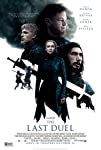Eye For Film >> Movies >> The Last Duel (2021) Film Review
The Last Duel
Reviewed by: Andrew Robertson

Ridley Scott's first feature was The Duellists. It was a film with a famous cast, a central conflict between men in the context of conflicts between nations, not just men but men who soldiered with horse, set in historic France, based on another's text. All of these are true of this film too. Yet Scott is and will likely ever remain more famous for his next two films, both also bound up in dualities and identities. Alien and Blade Runner both depicted futures, not pasts, but the rheum of what was then the present leaks through. The last perhaps the most important because Scott would return to reconstruct that film in multiple versions, to the extent that key elements are differently interpreted.
The Last Duel is nearly an hour longer than The Duellists, but in its Chapters of re-telling even for all the time they cover is much shorter than the 25 years between the theatrical and the Final cuts. Here there are just three versions, not seven, but their differences are as noticeable.

18-rated for 'sexual violence, strong bloody violence' those are both well in evidence. There's a "based on true events" at the start and there's a story underneath. Jean de Carrouges, in a trial by combat, put to the test the accusation that Jacque Le Gris had raped Marguerite de Carrouge. Within three chapters, each ending on the 29th of December of 1386, the story is told again.
That does mean the sexual violence is repeated. The strong bloody violence less so, but by the time we hit chapter two we've already seen a man beaten to death with his own gauntlet's wet end and numerous others expire almost explosively. One suffers the dual indignity not only of a flaming arrow to the face but having his clothes borrowed. That patterned fabric might raise questions of its own but as much because of its muted palette.
This is grey. Not just morally, but physically. A fortune spent on dyes for surcoats for them then to be washed out by the direction of photography. Dariusz Wolski has worked with Scott several times and there is more colour and variety in The Martian and the trailer for House Of Gucci than this. There is perhaps more in Dark City and The Crow too, or at least deeper contrasts. Whether scenes are lit by large glazed windows (possible because this is set in Normandy?) or huge amounts of candles (despite the constraints of household budgets) or in wood or ford or arena this is not so much cold as dull.
Jean de Carrouge is Matt Damon, scarred solidity under a woeful mullet. He seeks justice after a campaign against him that culminates in the attack upon his wife. Chapter one is his. Perhaps doubly, in fact, as the suggestion is that the three writers each took a section. Adam Driver is le Gris, swishing his cape like he got to keep Kylo Ren's foley crew as a benefice of Disney. He is a victim of misunderstanding, plagued by people who just do not understand how things are done. He is a polyglot, a polymath, possessed of a skill with accounts that includes the use not of the exchequer or counting board but an abacus. Jodie Comer is Marguerite, a second wife to an older man brought into a feud long soured. She is a a better husbandman to the estate than her husband, put upon by her mother-in-law, a resource to be traded by her father, a person to be misunderstood and judged by others.
There are multitudinous other roles that appear and reappear. Alex Lawther as King Charles VI, though at the time it was a regency of his four uncles. He swings as one might expect from 'the beloved' to 'the mad' but the timing of the duel with the birth and death of the first Dauphin is not mentioned. Harriet Walter, Nicole de Carrouges, is beloved of her son and bedevils his wife in unequal measures. Ben Affleck as Count Pierre d'Alencon is a hard-partying coastal landlord though at times he seems far more of Miami and pole-dance than Normandy and bocage.
Affleck and Damon write, joined by Nicole Holofcener. She co-wrote Can You Ever Forgive Me?, adapted Every Secret Thing. The world of uncertain truths is one not unfamiliar to her and in truth I am still uncertain about The Last Duel.
I didn't like it. That obviously doesn't mean it isn't good, but I'm not sure about that either. I don't know how many times Rashomon has been retold. "most of the time we can't even be honest with ourselves" is from (one translation) of that film and the three narratives are that. Carrouges is forthright and honest and put upon by scheming. LeGris is the hero of his own story, women love him, men respect him, wealth and power flow to him like water downhill. Marguerite's chapter is not just numbered but subtitled 'the truth' before adding 'according to...'.
I've mentioned the colour palette, you can tell it's the past because it's all grey and gritty but if they'd hung a different filter it could have been the Horn of Africa for Blackhawk Down or some space-Iceland full of space-freezers. It does at times seem as if all the subtlety has been reserved for the photography. There's a point where de Carrouge near enough shouts "This is a metaphor!" as he smacks synecdoche with a spade. There are outright declarations here, no bowdlerisation, no idiom, no skirting. To give context to the 18 for the violence there's a bit where Ben Affleck says the C-word and if you're not a British character actor that would usually get a mention.
That heavy-handedness extends beyond the literal dropping of gauntlets and that aforementioned punchee. In Lapham's Quarterly* Eric Jager (upon whose book(s) this is based) discussed not only the case but the quality of Marguerite's testimony. In a parliamentary investigation, remembering obviously that rooted in Roman law French jurisprudence is traditionally inquisitorial rather than adversarial practises, testimonies could be and were compelled with torture. The consequence of false witness would be drastic, to be burned alive. At the final duel Marguerite is perched upon a stand of firewood though this (too) is ahistoric. The process itself is compressed from months to weeks (to filmic minutes) and this is not the only time one suspects the interests of story superseded anything approaching accuracy. Yet that poisonous suspicion leaks through, at times unwarranted.
Normandy might not be known for blue cheeses but there was trade enough. A reminder that we're in France by having a whole wheel of what's probably Camembert on a table is just a continuation of heavy handedness. DeGris was made a knight on the day of the duel so that it was, notionally, a contest of equals. One contemporaneous branch of the family does have a crest that has a carrion crow above a green serpent, though the form of superposition means one should appear in front of rather than atop the other. Carrouges did fight at Limoges, or at least outside it, though that battle and its aftermath were even more of a bloodbath than we see. Carrouges and LeGris were not just friends but potentially quite close. Not just martial brotherhood, the latter was godfather to Carrouges' first son. A son who, with his mother, passed, not just offscreen but unacknowledged.
I mention all this because I was thinking about it rather than being invested in character, amusing myself by winding up my inner mediaevalist like thread on a bobbin because my disbelief was not suspended. This takes two hours and 32 minutes to tell the same story three times, which is 64 minutes more and one time less than Kurosawa took, and that's to say nothing of the budget.
In repeatedly showing the assault it seems to want to establish the importance of perspective, but its structure has already made that case. It does allow for contrast with 'marital duty' but the repeated references to 'little death' and its importance for conception seem less about exploring differing mores than allowing a staggeringly clumsy bit of "just like modern politics." The events around the assault have been changed here too. It is not debt that secures entry but a request for shelter while a horse is shoed. Hot-shoeing, if you wondered, comes about two centuries later, so this is not as odd as it might seem. What is harder to make fast is the point.
The three chapters are from different perspectives but apart from who is framed centrally they look the same. If Joseph Gregson-Williams' score has separate themes for each character then they were an outpost of subtlety that I have underserved by underhearing. It might have been staggeringly obvious to filter things by colour for each retelling but it's staggeringly obvious to repeatedly restate the stakes when someone is tied to one.
We start and end with the duel, and it too is a bloody business. I'm not sure it's the right kind of axe, the helmets are for showing faces and not protecting them, and there are changes to the collateral damage if not the outcome. The fighting is not maneuver for advantage but a battering, and I know it is to flog a dead horse but we have a better idea than ever as to what the martial arts of the era looked like and they are more exciting and skilled than this. It wouldn't matter but it's the name of the film.
In the end we must perhaps accept that this is a France as real or unreal as that of Wes Anderson, and that the truth and its consequences are a matter of debate still. I would counsel that you might be better to make a donation to a rape crisis charity and watch The Green Knight instead because you will feel better and will have done more good. I know that everyone involved here has done better elsewhere. I find myself thinking after mentioning The Green Knight how liberally the death of Arthur takes to being moved to Camelots various, and in so doing where the film talks about "novels" when even "romances" would be not only less anachronistic but amusing in parallel. I find that I am done with all this weighing of the truth, an eye for an eye and a tooth for a tooth, but you've got something here to lose. Show mercy, seat yourself elsewhere.
*(Volume XIII, Number 2, Spring 2020, The Woman In Black)
Reviewed on: 14 Oct 2021

















